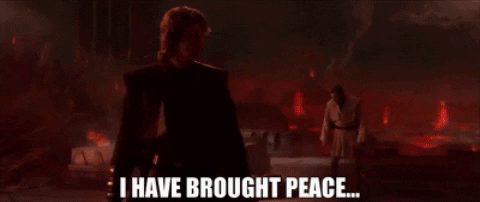When I saw him, I thought of Satan and Lucifer in “Paradise Lost.”
I thought of the devil in “Dante’s Inferno.”
I mean, you’ve really — have brought from
— it seems to me —
from way down in our unconsciousness this image of —
of Evil, of The Other.
GEORGE LUCAS:
Well, yeah.
We were trying to find somebody who could compete with Darth Vader, who’s one of the most, you know, famous evil characters now.
And so we went back into representations of evil.
Not only, the Christian, but also Hindu and Greek mythology and other religious icons and, obviously, then designed our own — our own character out of that.
BILL MOYERS:
What did you find when you went back there in —
in all of these representations?
There’s something …
GEORGE LUCAS:
A lot of — a lot of evil characters have horns.
It’s very interesting.
I mean, you’re trying to build a icon of evil,
and you sort of wonder why the same images evoke the same emotions.
BILL MOYERS:
What emotion do you feel, George, when you look at Darth Maul?
GEORGE LUCAS:
I think the first thing you’re supposed to react to is fear.
You’re supposed to go,
‘Ooh. You — you wouldn’t want to meet him in a dark alley.'
And I’m not creating a monster.
I didn’t want to create some ugly — somebody ripped out their intestines and threw them all over their head
— and it’s — you can’t watch it.
This is something …
BILL MOYERS:
It’s actually mesmerizing.
GEORGE LUCAS:
This is something that is more —
it works in a different emotional way.
It’s not repulsive, it’s just —
It’s something you should be afraid of.
BILL MOYERS:
Is the emotion you wanted from him different from the emotion you wanted from Darth Vader?
GEORGE LUCAS:
It’s essentially the same in a different kind of way.
Darth Vader was a — a composite man.
I mean, he was half-machine, half-man.
And that’s where he lost a lot of his humanity is that he —
you know, he has mechanical legs.
You know — and he has mechanical arms possibly and he’s hooked up to a breathing machine.
So there’s not much, actually, human left in him.
This one is all human.
And I wanted him to be like an alien, but I wanted him to be human enough that we could identify with him, because he’s not a sort of a monster we can’t identify with. He’s…
BILL MOYERS:
He’s us.
GEORGE LUCAS:
…he’s — yeah.
He’s the evil within us.
BILL MOYERS:
I’ve had psychotherapists tell me that they use “Star Wars” sometimes to deal with the problems of their child patients.
And they’ve said that the most popular character among the children is Darth Vader.
GEORGE LUCAS:
Well, children love power because children are The Powerless.
And so their fantasies all center on having power.
And who’s more powerful than Darth Vader, you know?
And, some, you know, will be attracted to Luke Skywalker because he’s the good guy.
But ultimately,
We all know that Darth Vader’s more powerful than he is.
GEORGE LUCAS:
And as time goes on, you discover that he is more powerful because—
He's The Ultimate Father
Who is All-Powerful.
BILL MOYERS:
This is where I disagree somewhat with our friend Joseph Campbell who said that
The Young Man has to slay his father before he can become an adult himself.
It seems to me, and I think you’re right on here, that
The Young Man has to identify —
has to recognise and acknowledge that
He is His Father
and
Is Not His Father.
GEORGE LUCAS:
You know, Joe used to talk about the basic issues that create
The Mystery of Life.
Of, you know, birth and death,
and I like to always add,
Your relationship with your parents.
BILL MOYERS:
Do you know yet what is going to be the transforming of Anakin Skywalker into Darth Vader?
GEORGE LUCAS:
Yeah.
BILL MOYERS:
You already know that?
GEORGE LUCAS:
Yeah, I know what that is.
And it’s sprinkled throughout this episode.
I mean, the groundwork’s been laid in this episode.
And the — the film is ultimately about the Dark Side and the Light Side, and those sides are designed around compassion and greed.
And we all have those two sides of us and that we have to make sure that those two sides of us are in balance.
BILL MOYERS:
I think it’s going to be very hard for the audience to accept that this innocent cherub almost of a boy, who’s playing Anakin Skywalker, can ever be capable of the things that we know happen later on.
And I’m sure you’ll take care of that but, you know, I look at Hitler and wonder what did he look like at eight years old, or Stalin …
GEORGE LUCAS:
Mm-hmm …
BILL MOYERS:
… or …
GEORGE LUCAS:
Well, there are lots of — there’s a lot of people like that.
I mean, you just — you see them all the time and you — that’s what I wonder.
I wonder,
'How can those people possibly exist? How could they live with themselves?'
[ VODKA ]
How could they — you know, what is it in the human brain that gives us the capacity to be as evil as human beings have been in the past and are right now.
BILL MOYERS:
Well, you’ve been probing that for a good while now.
GEORGE LUCAS:
Yeah.
BILL MOYERS:
Twenty-five years.
Have you come to any conclusions?
GEORGE LUCAS:
I haven’t.

